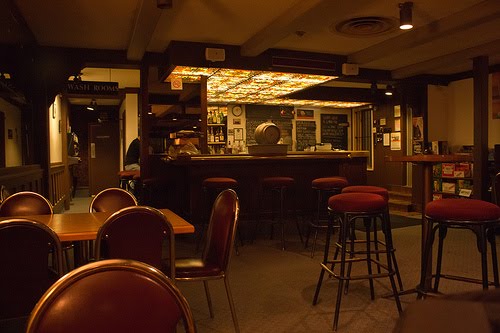The Lo Pub and Bistro, an Ellice Avenue staple and the University of Winnipeg’s long-time student bar, recently closed its doors for the last time.
I was there briefly on the last night, standing in line for a beer amidst the onslaught of regular customers; gasping for air as people crowded the bar, sucking the oxygen out of an already sweaty and humid room.
Despite the closure, this was not the first time the Lo Pub had been busy. We all knew the pub was profitable but collapsing under the weight of a floundering 120-bed upstairs hostel that had accumulated years worth of debt under the leadership of Hosteling International Manitoba.
As such, the atmosphere was a celebratory tribute to all manager Jack Jonasson had accomplished in the Lo Pub’s short lifespan. His customers—a unique group of hipsters, intellectuals and musicians– were dancing and laughing for the last time in a place they had loved.
And yet, below the surface, there was a palatable sense of anguish in the room.
If a business in such close vicinity to a student population exceeding 10,000 could close, what other businesses could go down in defeat? And, more importantly, what was left that hadn’t been defeated?
The Lo Pub and Bistro was Jonasson’s long-time dream. Inspired by his extensive travels in Europe, the business was meant to provide an antidote to the dreary dives that populate too much of downtown Winnipeg.
A small bar and restaurant suddenly became an important local development project that transformed the previous tenant—a seedy bar that periodically erupted into violence—into a safe place for local bands and good conversationalists to showcase their talent.
Within less than a year, Winnipeggers had lost many small businesses all over the city that were just as valuable to the community. On Ellice Avenue alone, Ellice Cafe and Theatre, the Black Sheep Diner, Edohei Sushi and sex shop Discreet Boutique had all closed.
We could all feel the weight of other closures in the room that night.
In Winnipeg, when a small business shuts its doors for good, there is little assurance that something more profitable (and just as cool) will rise from the ashes. In fact, there is an active suspicion that small businesses just can’t catch a break in the city. And right now, that suspicion isn’t too far from the truth.
After all, the Forks North Portage Partnership—a publicly funded development firm that owns the Lo Pub/Hi Hostel building and was intimately involved in the failed hostel itself—responded to questions about the building’s fate by referencing a plan that has constantly failed small businesses.
As described briefly in the Winnipeg Free Press, the Forks North Portage is looking for a tenant for the building that will be conducive to the Sports, Hospitality and Entertainment District (SHED)—a planned entertainment zone designed to attract people downtown for hockey games, concerts and events at an expanded Winnipeg Convention Centre.
According to an article by Daniel Camp and Brent D. Ryan in the Journal of Urban Design, entertainment zones need to happen organically in order to be successful. Aided by careful and deliberative government regulations, private developers can become attracted to the low real estate costs seen in blighted downtown areas and slowly evolve the neighbourhoods into clubbing or entertainment hubs.
The SHED is the opposite of this organic development. Through heavy government involvement, it seems instead to be driving out attractive small businesses in favour of mega-projects.
Will Doig at Salon.com, cites Dallas’ ultra-planned Victory Park, arguing government-led entertainment districts are essentially “that swath of cityscape whose character has been preordained by a city council vote and is now identified by brightly coloured banners affixed to lampposts.”
Is this the downtown neighbourhood residents are looking for? Does anyone, other than the Forks North Portage and a handful of development heavy hitters, really want this for the heart of Winnipeg?
I don’t think so.
___
Ethan Cabel writes for the Spectator Tribune.
Follow us on Twitter: @SpectatorTrib
